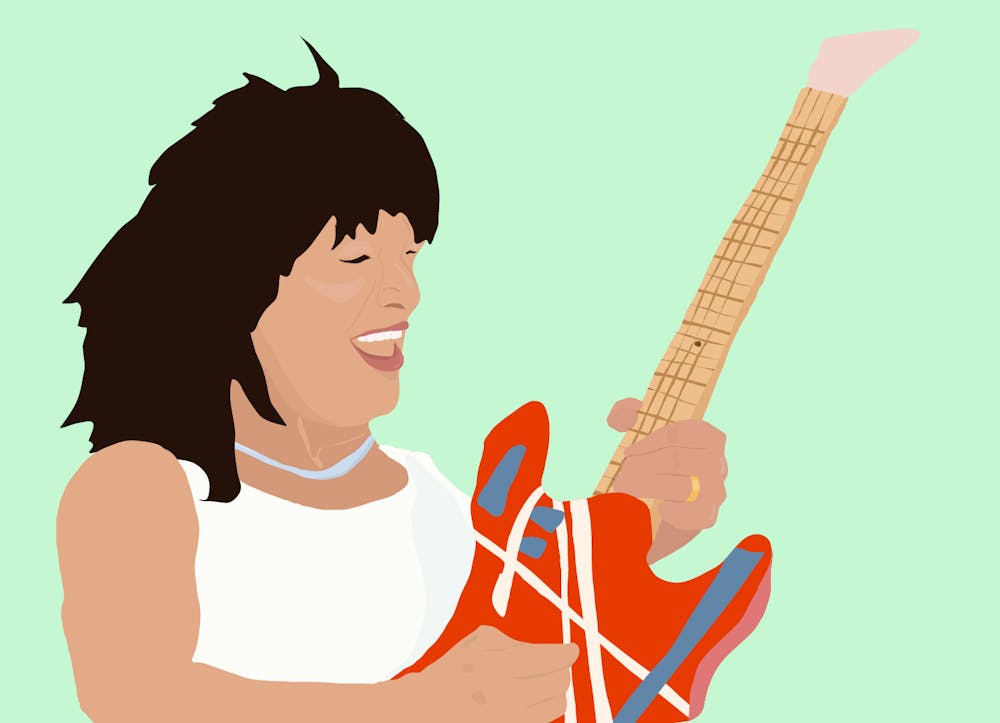On Tuesday, Oct. 6, we lost one of the greatest rock and roll guitarists of all time. Aside from founding the decade–defining band Van Halen, Eddie Van Halen planted the technical and stylistic seeds for generations of guitarists in both rock and metal music.
Born in the Netherlands, Eddie was a young child in 1962 when his family moved to Pasadena, Calif. With a family of musicians, music had always played a major role in his life. By 1972, he had formed a group called Mammoth with his older brother Alex, which was renamed to Van Halen two years later.
In 1978, after having signed a record deal with Warner Bros. Entertainment Inc., the band released their groundbreaking, self–titled debut album, Van Halen. With timeless classics such as “Runnin’ with the Devil,” a cover of The Kink’s hit “You Really Got Me,” and “Ain’t Talkin ‘Bout Love,” the record went platinum within months. However, this was nothing compared to the band’s future success. They put out records annually for the next four years, each charting higher than the last, all while maintaining remarkable depth and virtuosic musicianship.
Subsequently, Van Halen leaped to the forefront of popular '80s music with the classic album 1984, which included hits like “Jump” and “Panama.” 1984 marked lead singer David Lee Roth’s last album with the band, yet despite losing their vocalist's immense star power, Van Halen continued to grow commercially under the new lead singer Sammy Hagar. There’s no denying that Van Halen was at the center of mainstream attention throughout the '80s: they have the second most Billboard Hot 100 hits of all hard rock and metal bands in the '80s (with 14 charting songs, just below Heart's 15), and they're currently the 20th best selling group/artist ever.
Van Halen never fell off, but their work from the late '70s and early–to–mid '80s is when they really revolutionized rock and roll. Living right on the intersection of pop and heavy rock music, Van Halen commanded everyone’s attention, and it was hard to find anything to dislike about them. Still, what earns Van Halen the respect of dedicated rock enthusiasts is the drive and profound work of Eddie Van Halen, who was always the main songwriter—and main draw—of the band.
Their debut album marked the beginning of a new chapter in the Bible of rock guitar. Perhaps Eddie’s greatest exhibition of proficiency and soul is his astounding solo track "Eruption,” included in the debut album. While the studio version is less than two minutes, Eddie would show off for much longer during the live renditions. Look at his face: It's like he's thinking, “Okay, time to make Page, Hendrix, Clapton, and all of my predecessors sound like a bunch of amateurs.”
Eddie popularized and invented countless techniques that have become cornerstones of technical soloing ever since. Notably, the technique of two–hand tapping, in which one uses both their picking hand and fret hand to fret notes, didn’t exist whatsoever in any popular music before Van Halen. Through tapping, guitarists could produce a unique legato sound and play super fast without much strain. Eddie even expanded the technique by introducing tap bends, tap slides, tap harmonics, and a variety of other related sounds that previously were totally alien to the guitarist’s ear.
Similarly, Eddie is generally credited for popularizing the Floyd Rose tremolo, which allows guitarists to quickly drop the tone of all strings and then release for a psychedelic effect just like a traditional whammy bar. It adds the ability to quickly raise the strings’ tone and release without messing with the guitar’s tuning. This device was incorporated into Eddie's highly modified, iconic guitar model called the "Frankenstrat."
Beyond just the guitar, Eddie felt the need to personally engineer each aspect of sound that would be heard in his final guitar works. Even the best and most expensive guitars and equipment on the market were never good enough. In a 2012 interview with Guitar Center, Eddie put forth his thoughts straightforwardly: “I build my own guitars and amps. These are the tools I need to do my job.” While many dedicated rock musicians become successful enough to patent their own products, Eddie is the only one to have such an enormous, major line of products that includes guitars, amps, pedals, and all types of gadgets. His brand EVH, officially owned by Fender Musical Instruments Corporation, has among the best reputations in the industry in the way of quality, well–engineered products.
As an enormous fan, what I find most exceptional about Eddie is that the culmination of his original techniques and sound effects were so inventive that even today—over 40 years after his debut album’s release—his revolutionary playing still sounds futuristic. Eddie completely shocked the world of guitarists in 1978, and at least with Van Halen’s subsequent work, listeners generally knew what they were in for. One can only imagine the number of young rockers Eddie alone inspired.
Last week was devastating for Eddie’s family and close friends above all else, and it was also a tragedy for the entire community of rock musicians around the world. While there’s no telling all of the amazing things he would’ve continued to accomplish, few people, let alone rock guitarists, can live up to his inspiring legacy.

